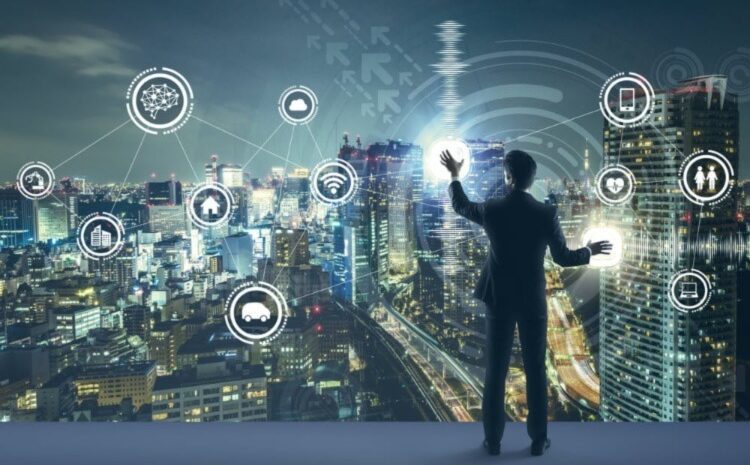Smart Cities with AI: Transforming Urban Living
Cities around the world are growing at an unprecedented pace, with more than half of the global population now living in urban areas. This rapid urbanization brings both opportunities and challenges. On the one hand, cities offer economic and social benefits, such as job opportunities and cultural diversity. On the other hand, cities also face numerous challenges, including traffic congestion, pollution, and inadequate infrastructure. But with the help of artificial intelligence (AI), cities can become smarter and more livable. In this blog post, we’ll explore how AI is transforming urban living.
What Are Smart Cities?

Smart cities use data and technology to improve the quality of life for their residents. They leverage technologies such as the Internet of Things (IoT), big data analytics, and AI to optimize city operations and services. The goal of smarter cities is to create more sustainable, efficient, and responsive urban environments.
How Can AI Help Build Smart Cities?

AI can be used in many ways to build smarter cities. Here are some examples:
Traffic Management: AI-powered traffic management systems can analyze real-time traffic data to optimize traffic flow and reduce congestion. This can lead to shorter travel times, lower fuel consumption, and reduced air pollution.
Energy Management: AI can help cities optimize energy use by analyzing data from sensors and smart meters. This can help reduce energy waste and lower carbon emissions.
Waste Management: AI-powered waste management systems can analyze data on waste generation and disposal to optimize waste collection and recycling. This can help reduce landfill waste and promote a more circular economy.
Public Safety: AI can help improve public safety by analyzing data from surveillance cameras and other sensors. This can help identify potential safety risks and enable faster emergency responses.
Water Management: AI can help cities manage water resources more efficiently by analyzing data on water consumption and quality. This can help reduce water waste and ensure access to clean water for all residents.
Benefits of Smart Cities with AI

Smart cities with AI offer numerous benefits to residents, businesses, and governments. Here are some of the main benefits:
Increased Efficiency: AI-powered systems can optimize city operations and services, reducing waste and improving efficiency. This can lead to cost savings for governments and businesses, as well as a better quality of life for residents.
Improved Sustainability: Smarter cities with AI can help reduce carbon emissions, waste, and resource consumption. This can promote a more sustainable and resilient urban environment.
Enhanced Quality of Life: AI can help improve public safety, reduce traffic congestion, and enhance access to public services. This can lead to a better quality of life for residents.
Economic Growth: Smart cities with AI can attract new businesses and investment, creating job opportunities and driving economic growth.
Challenges of Smart Cities with AI
While the benefits of smart cities with AI are clear, there are also challenges that need to be addressed. Here are some of the main challenges:
Data Privacy: Smart cities with AI rely on data from sensors and other sources, raising concerns about data privacy and security. Governments and businesses need to ensure that data is collected and used in a responsible and transparent way.
Bias and Discrimination: AI-powered systems can amplify existing biases and discrimination, leading to unfair outcomes for certain groups of people. To avoid this, we need to ensure that AI is developed and used in a fair and equitable way.
Digital Divide: Not all residents have access to the technologies and services that make cities smarter. This can create a digital divide that reinforces existing inequalities. To address this, we need to ensure that all residents have access to the technologies and services that make cities smarter.
Ethical Considerations: Smart cities with AI raise ethical considerations around the use of technology to govern and manage urban environments. Governments and businesses need to ensure that the use of AI in cities is aligned with ethical principles such as accountability, transparency, and inclusivity.
Technical Challenges: Building smart cities with AI requires significant technical expertise and investment. Governments and businesses need to invest in the development and deployment of AI technologies to realize the full potential of smart cities.
Conclusion
AI has the potential to transform urban living and create smarter, more sustainable, and more livable cities. With the help of AI-powered systems, cities can optimize their operations and services, improve public safety, reduce carbon emissions, and enhance the quality of life for residents. However, there are also challenges that need to be addressed, such as data privacy, bias and discrimination, the digital divide, ethical considerations, and technical challenges. To build truly smarter cities, we need to address these challenges and ensure that AI is developed and used in a responsible and equitable way.
Writer
Naza Rahida Siddiqe Priya
Intern, Content Writing Department
Requin BD





Write a Comment